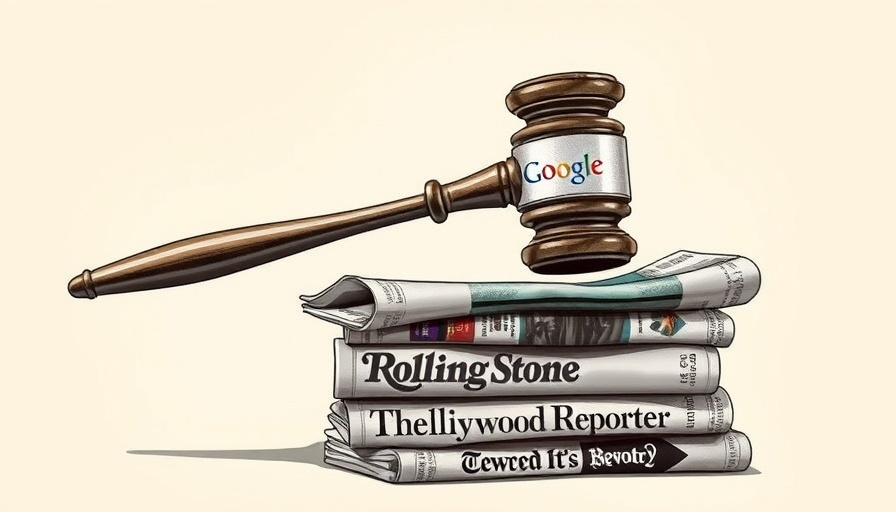
Penske Media's Bold Move Against Google: A Look at the Lawsuit
Penske Media Corp., known for iconic media brand Rolling Stone, recently stirred the waters of digital publishing by filing a lawsuit against Google LLC. The complaint alleges that Google is abusing its search monopoly and coercing publishers, like Penske, to surrender their content without fair compensation. The heart of the issue lies in Google's AI summaries, which Penske claims repurpose their journalism without consent.
The Essence of the Complaint: Misuse of AI Summaries
At the crux of this controversy is the functionality of Google’s AI summaries. These concise overviews appear prominently in search results, enabling users to glean information without clicking through to the original articles. Penske asserts this practice diverts potential readers from their content, thereby undermining traffic and ad revenue for publishers. By effectively utilizing third-party journalism to train its AI models, Google stands accused of exploiting the very work that fuels its services.
Legal Grounds: Sherman Act Violations
Penske's lawsuit delineates several serious legal claims under the Sherman Act. Central to these claims are allegations of unlawful reciprocal dealing, monopolization, and common-law unjust enrichment. The firm argues that Google's practices not only violate anti-trust laws but also create an untenable situation for publishers who find it nearly impossible to opt out of Google’s ecosystem without suffering significant traffic loss. This case exemplifies the challenges faced by publishers in the evolving digital landscape, where search engines hold substantial power.
The Bigger Picture: Google's Response and Industry Implications
In reaction to the lawsuit, Google defended its AI Overviews, stating that they enhance user experience and help promote a more diverse range of content. Google’s spokesperson emphasized the billions of clicks directed to various sites, arguing that the summaries can benefit publishers by increasing exposure. Yet, this defense raises questions about the actual impact on traffic and revenue for smaller publishers amid a landscape dominated by a single corporate giant.
Insights from Comparable Cases: Chegg's Precedent
Penske Media's lawsuit is not isolated; it echoes similar concerns raised by Chegg Inc., an education tech firm that previously filed a suit against Google over its AI summaries. Chegg claimed that these summaries hurt its website traffic, illustrating a trend among various companies struggling against Google’s overwhelming leverage in the market. The outcomes of both cases could set significant precedents for how digital content is treated and provide a framework for other companies looking to challenge perceived injustices in the tech landscape.
Future Predictions: The Evolution of AI and Content Publishing
This lawsuit highlights an urgent debate about the future of journalism in the age of AI. As AI capabilities continue to advance, so too does the potential for tensions between content creators and technology companies. The outcome of Penske Media's legal battle may redefine the operational norms of how search engines utilize journalistic content and, consequently, alter the broader landscape of digital media. Publishers may need to re-evaluate their partnerships with tech platforms to safeguard their interests and ensure fair compensation for their work.
Call to Action: Advocating for Fair Practices in Digital Media
The lawsuit filed by Penske Media represents a critical juncture for the media industry. As AI technology continues to evolve, it is essential for content creators to advocate for fair practices that preserve the integrity and sustainability of digital journalism. Engaging with this topic could help shape future discussions around AI technology, advertising revenues, and the ethical responsibilities of platforms that distribute news.
 Add Row
Add Row  Add
Add 




Write A Comment